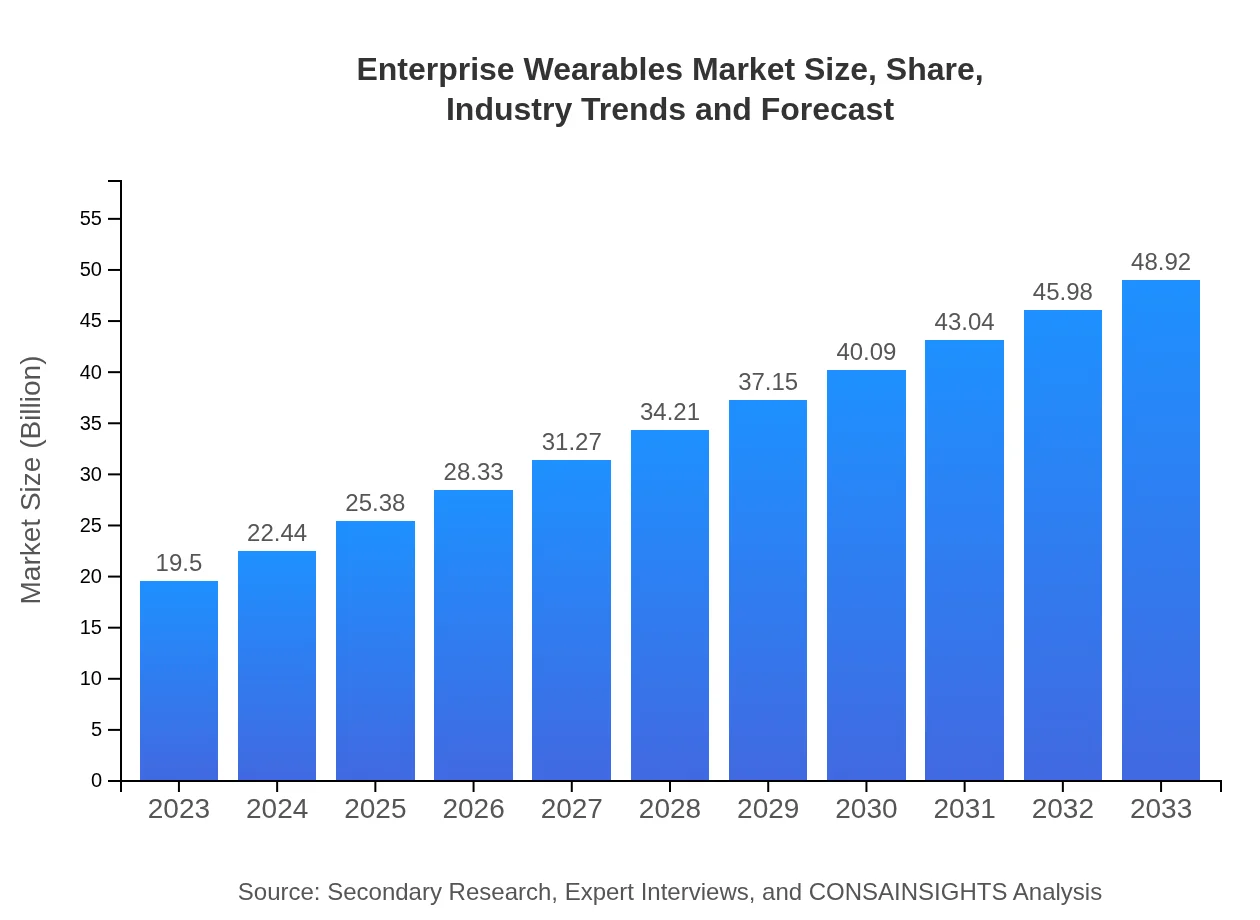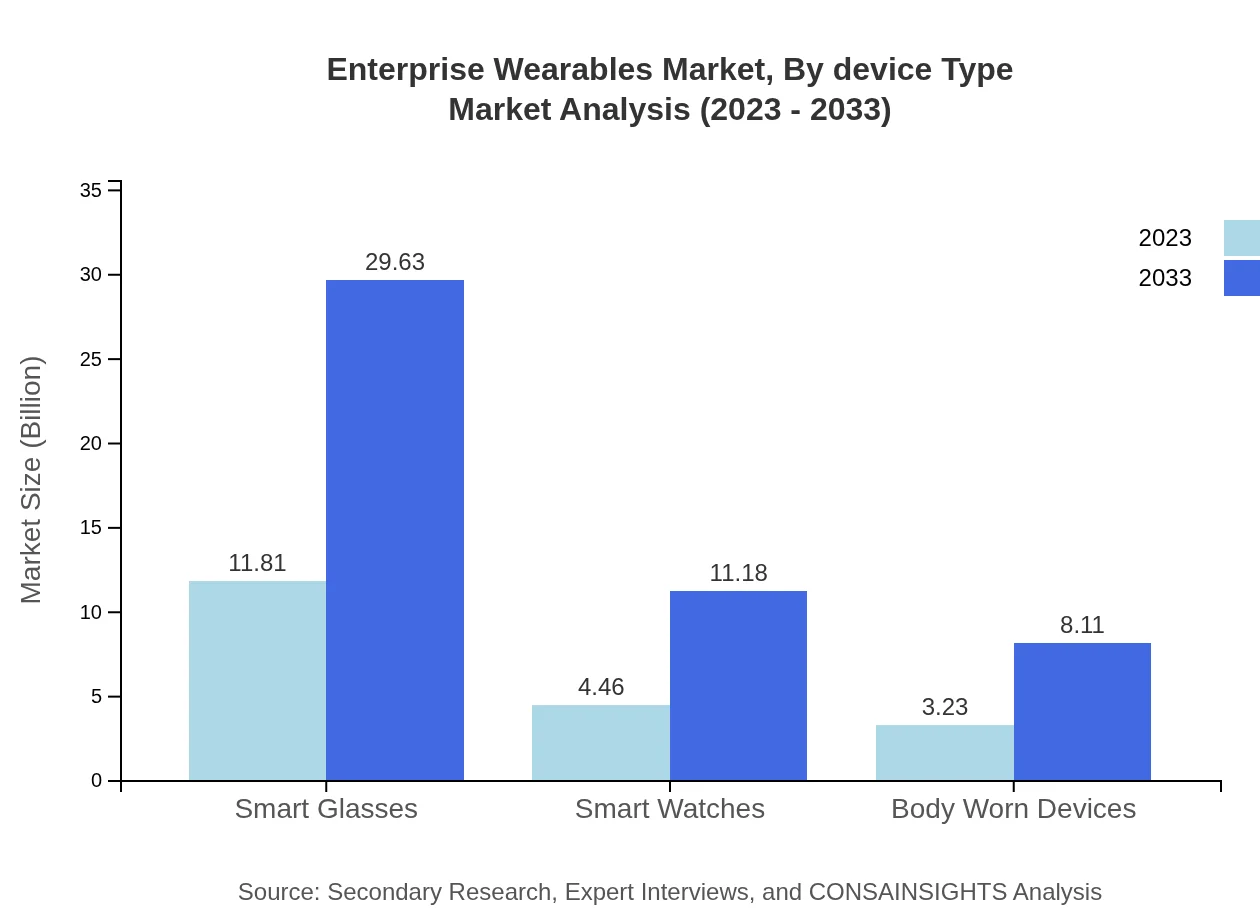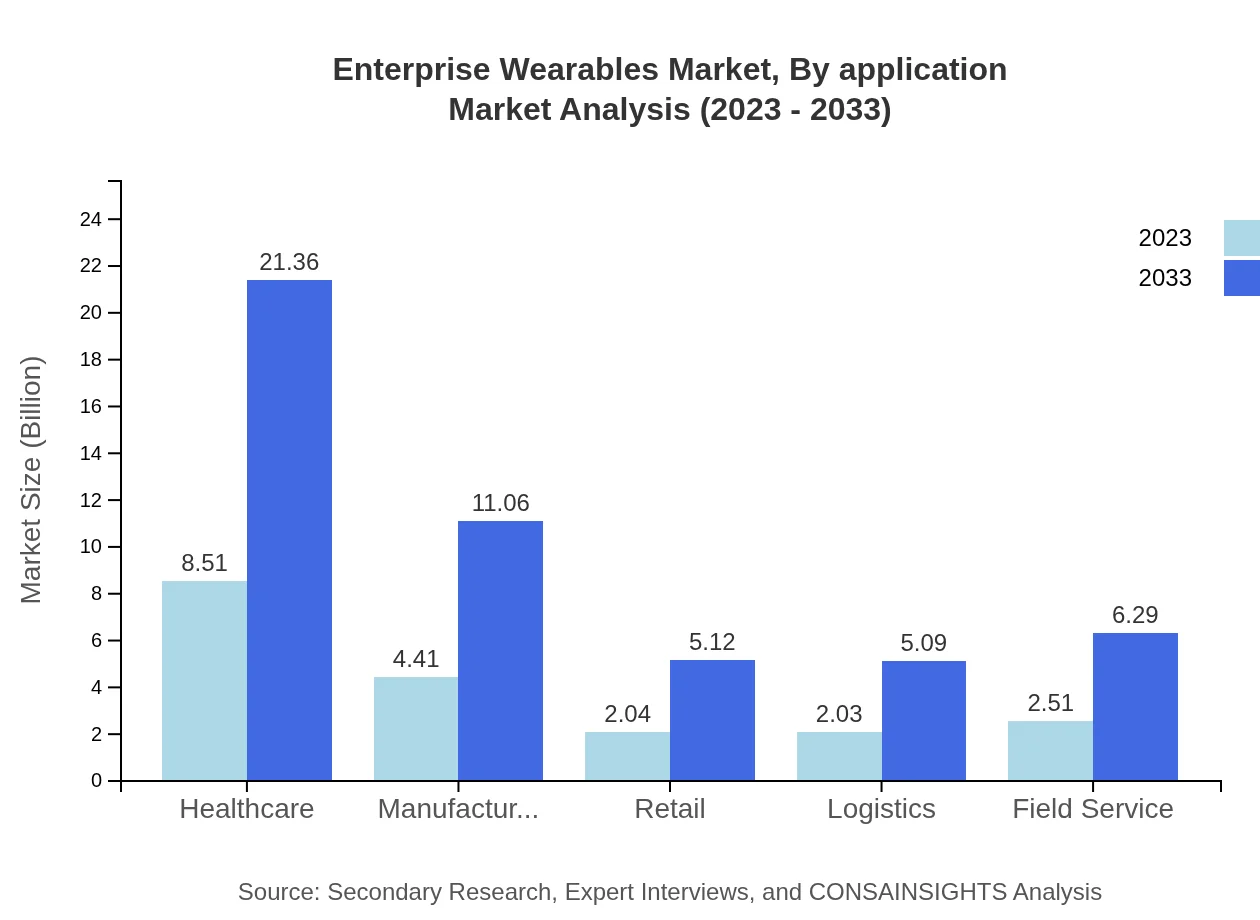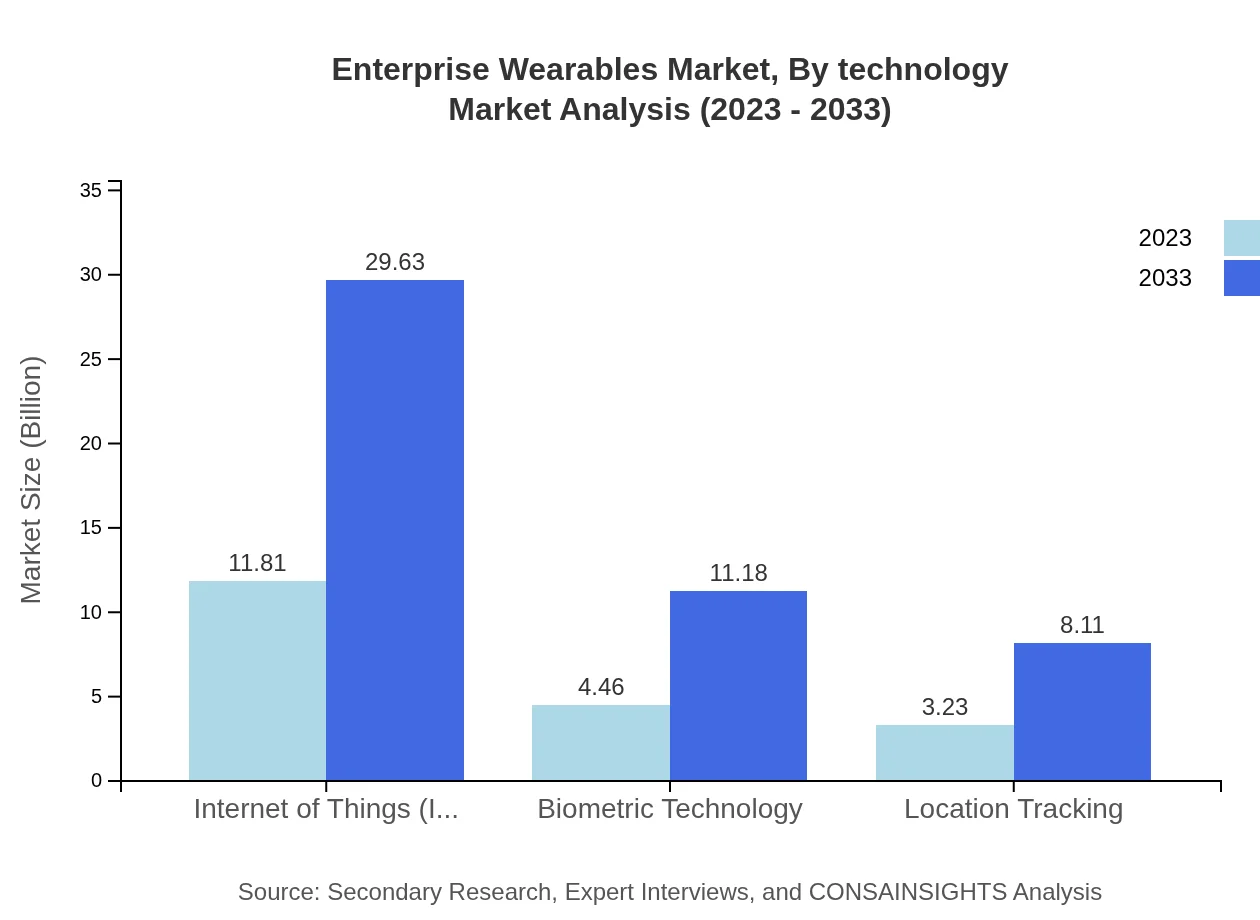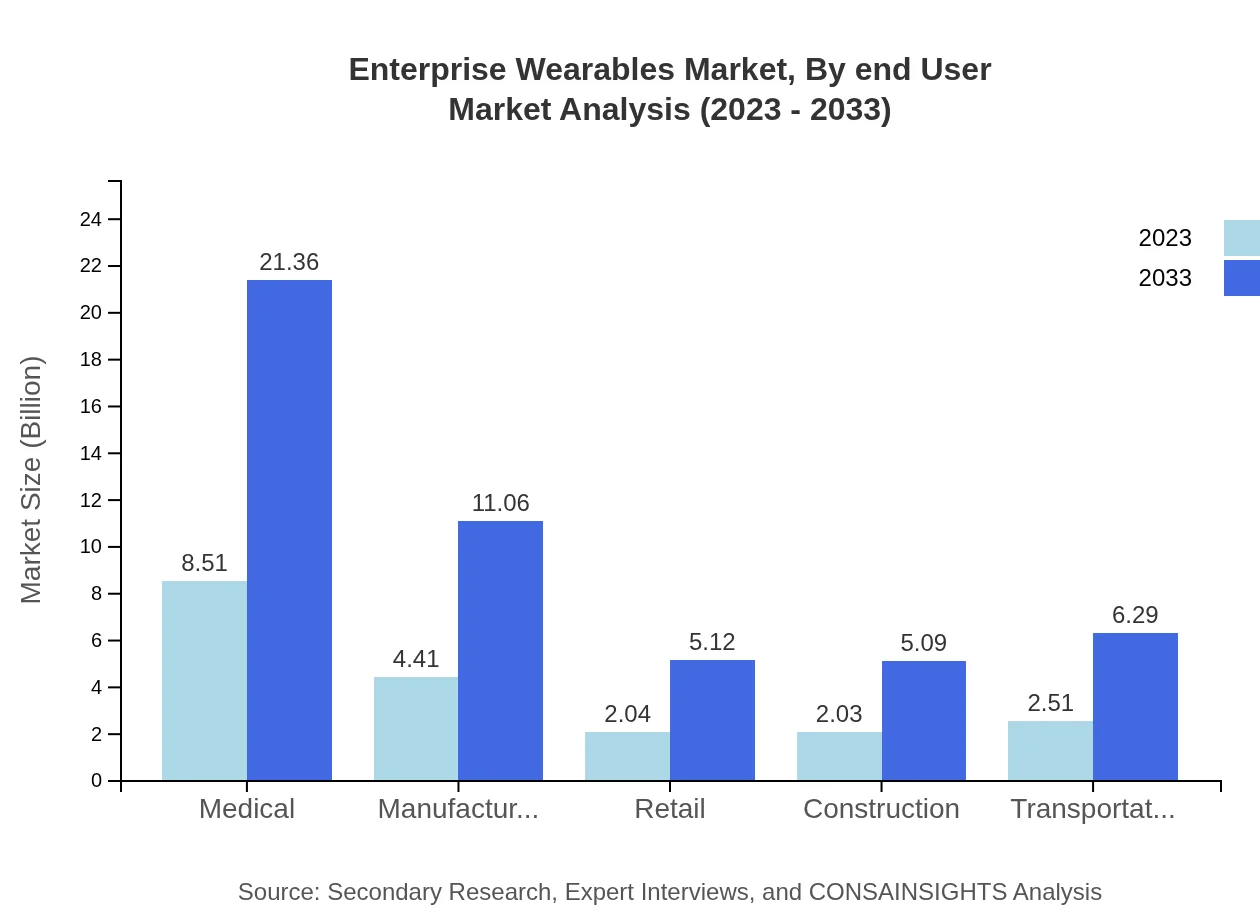Enterprise Wearables Market Report
Published Date: 31 January 2026 | Report Code: enterprise-wearables
Enterprise Wearables Market Size, Share, Industry Trends and Forecast to 2033
This report provides a comprehensive analysis of the Enterprise Wearables market, including insights on market size, industry trends, technology advancements, and regional specifics from 2023 to 2033.
| Metric | Value |
|---|---|
| Study Period | 2023 - 2033 |
| 2023 Market Size | $19.50 Billion |
| CAGR (2023-2033) | 9.3% |
| 2033 Market Size | $48.92 Billion |
| Top Companies | Apple Inc., Microsoft Corporation, Samsung Electronics, Google LLC, Fitbit, Inc. |
| Last Modified Date | 31 January 2026 |
Enterprise Wearables Market Overview
Customize Enterprise Wearables Market Report market research report
- ✔ Get in-depth analysis of Enterprise Wearables market size, growth, and forecasts.
- ✔ Understand Enterprise Wearables's regional dynamics and industry-specific trends.
- ✔ Identify potential applications, end-user demand, and growth segments in Enterprise Wearables
What is the Market Size & CAGR of Enterprise Wearables market in 2023?
Enterprise Wearables Industry Analysis
Enterprise Wearables Market Segmentation and Scope
Tell us your focus area and get a customized research report.
Enterprise Wearables Market Analysis Report by Region
Europe Enterprise Wearables Market Report:
The Enterprise Wearables market in Europe is poised to grow from USD 4.98 billion in 2023 to USD 12.49 billion by 2033. Additionally, a strong emphasis on health and safety regulations is fuelling the adoption of wearable technologies in the workplace.Asia Pacific Enterprise Wearables Market Report:
In 2023, the Enterprise Wearables market in the Asia Pacific region is valued at USD 3.78 billion. By 2033, it is projected to reach USD 9.49 billion. The Asia Pacific region demonstrates significant growth due to the increasing adoption of technology in industries such as healthcare and manufacturing, supported by government initiatives aimed at digital transformation.North America Enterprise Wearables Market Report:
North America leads the Enterprise Wearables market, with a valuation of USD 6.96 billion in 2023, projected to reach USD 17.46 billion by 2033. The USA is a significant contributor to this growth, with strong investment in technology and a focus on workplace safety, especially post-pandemic.South America Enterprise Wearables Market Report:
The South American market for Enterprise Wearables is expected to grow from USD 1.21 billion in 2023 to USD 3.04 billion by 2033. The region's growth is driven by improving internet connectivity and technological infrastructure, enabling enterprises to integrate wearables into their operations.Middle East & Africa Enterprise Wearables Market Report:
In the Middle East and Africa, the Enterprise Wearables market is expected to grow from USD 2.56 billion in 2023 to USD 6.43 billion by 2033. The region is increasingly focusing on health and safety measures in workplaces, further encouraging the growth of wearables.Tell us your focus area and get a customized research report.
Enterprise Wearables Market Analysis By Device Type
In the Enterprise Wearables market, key device types include smart glasses (USD 11.81 billion in 2023, USD 29.63 billion in 2033, 60.56% share), smart watches (USD 4.46 billion in 2023, USD 11.18 billion in 2033, 22.86% share), and body-worn devices (USD 3.23 billion in 2023, USD 8.11 billion in 2033, 16.58% share). Smart glasses are the most significant segment, driven by their applications in manufacturing, logistics, and healthcare.
Enterprise Wearables Market Analysis By Application
Key applications of Enterprise Wearables include healthcare (USD 8.51 billion in 2023, USD 21.36 billion in 2033, 43.66% share), manufacturing (USD 4.41 billion in 2023, USD 11.06 billion in 2033, 22.61% share), and construction (USD 2.03 billion in 2023, USD 5.09 billion in 2033, 10.41% share). The healthcare sector remains the largest segment, focusing on patient monitoring and telehealth.
Enterprise Wearables Market Analysis By Technology
The market can be categorized into Internet of Things (IoT) (USD 11.81 billion in 2023, USD 29.63 billion in 2033, 60.56% share), biometric technology (USD 4.46 billion in 2023, USD 11.18 billion in 2033, 22.86% share), and location tracking (USD 3.23 billion in 2023, USD 8.11 billion in 2033, 16.58% share). IoT technology is the most significant segment, facilitating real-time data analysis and monitoring.
Enterprise Wearables Market Analysis By End User
Key end-users of Enterprise Wearables include logistics (USD 2.03 billion in 2023, USD 5.09 billion in 2033, 10.41% share), field service (USD 2.51 billion in 2023, USD 6.29 billion in 2033, 12.85% share), and retail (USD 2.04 billion in 2023, USD 5.12 billion in 2033, 10.47% share). Logistics shows promising growth driven by the need for optimized supply chain management.
Enterprise Wearables Market Trends and Future Forecast
Tell us your focus area and get a customized research report.
Global Market Leaders and Top Companies in Enterprise Wearables Industry
Apple Inc.:
Apple Inc. is a leading player in the wearable market, continuously innovating with products like the Apple Watch and health-focused features.Microsoft Corporation:
Microsoft's HoloLens is a prominent enterprise solution offering augmented reality for training and collaboration.Samsung Electronics:
Samsung offers a range of smartwatches and health devices, establishing its presence in both consumer and enterprise markets.Google LLC:
Google Research and Develops significant wearable technologies, focusing on smart glasses and health monitoring systems.Fitbit, Inc.:
Fitbit specializes in health tracking devices and applications, catering to both personal and enterprise healthcare solutions.We're grateful to work with incredible clients.









FAQs
What is the market size of enterprise Wearables?
The enterprise wearables market is valued at $19.5 billion in 2023 and is projected to grow at a CAGR of 9.3%, reaching significant figures by 2033. This growth indicates a strong demand across various sectors.
What are the key market players or companies in the enterprise Wearables industry?
Key players in the enterprise wearables market include major technology firms focusing on smart wearable devices, IoT solutions, healthcare technologies, and manufacturing ergonomics. These companies drive innovation through competitive research and development.
What are the primary factors driving the growth in the enterprise Wearables industry?
Growth factors include the demand for remote health monitoring, enhanced operational efficiency in businesses, increased investments in IoT, and rising awareness of employee health and safety benefits. These factors contribute to a robust market expansion.
Which region is the fastest Growing in the enterprise Wearables market?
North America is the fastest-growing region for enterprise wearables, expected to grow from $6.96 billion in 2023 to $17.46 billion by 2033. Other regions like Asia Pacific and Europe also exhibit significant growth potential.
Does ConsaInsights provide customized market report data for the enterprise Wearables industry?
Yes, ConsaInsights offers customized market report data tailored to specific business requirements in the enterprise wearables industry, helping clients understand trends, forecasts, and competitive landscapes effectively.
What deliverables can I expect from this enterprise Wearables market research project?
Deliverables include detailed market analysis reports, insights on trends and forecasts, segmentation data, competitive landscape analysis, and customized recommendations tailored to your business's strategic needs in the enterprise wearables sector.
What are the market trends of enterprise Wearables?
Market trends include the growing integration of IoT and AI in wearables, increased adoption in healthcare and manufacturing, demand for smart glasses and watches, and an emphasis on employee productivity and safety monitoring.

